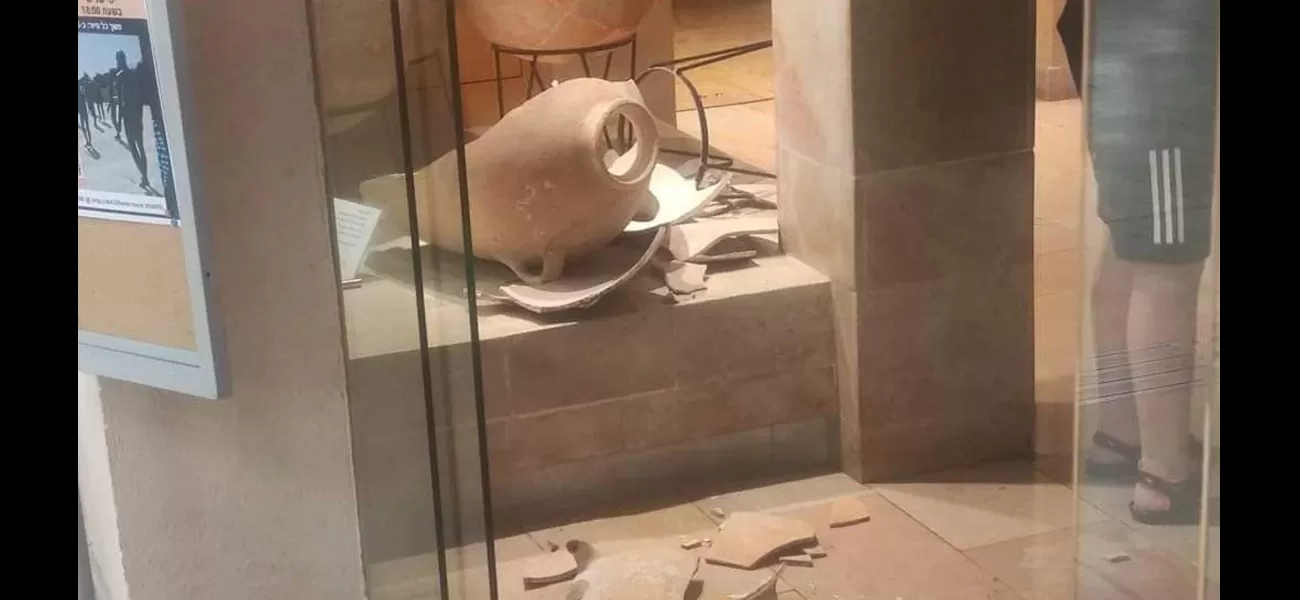Museum seeks 4-year-old who broke ancient vase.
Text is uncomfortable Feeling uneasy...
August 28th 2024.

In the Hecht Museum, a young boy made a careless mistake that resulted in a valuable artifact being shattered into pieces. This incident took place on a Friday, when the boy, who was only four years old, accidentally broke a 3,500-year-old urn that was on display at the museum. The urn, dating back to the late Bronze Age, was a rare find that had been discovered during excavations in the occupied West Bank and had been on display at the museum for the past 35 years.
What made this incident even more unfortunate was the fact that the urn was displayed without any protective glass around it. As a result, the boy and his mother, who were both understandably scared and shocked, quickly left the museum after the accident happened near the entrance. However, the museum's director, Dr. Inbal Rivlin, had a surprising reaction to the situation. Instead of being angry or upset, he reached out to the boy and his mother, inviting them to return to the museum for a guided tour.
Dr. Rivlin explained that he did not hold any grudges against the boy and his mother and that such incidents, although rare, can happen. He reassured them that the urn would be repaired and returned to its place through a process called restoration, which the museum's conservator would document on video. He even extended a special invitation to the boy and his mother to witness this fascinating process.
The reason why the urn was not behind a display case was due to the vision of the museum's founder, Dr. Reuven Hecht, who wanted to make the archaeological items as accessible as possible to visitors. However, Dr. Rivlin did caution parents to give their children guidance before visiting the museum to avoid any mishaps, unless it is explicitly stated that touching the exhibits is allowed.
It is worth noting that the Hecht Museum described the jar as rare and an impressive find, as most others from that period were found broken or incomplete. The museum's experts believe that the jar predates the days of David and King Solomon and was typically used for storing and transporting local consumption such as wine and olive oil. This incident serves as a reminder of the fragility of ancient artifacts and the importance of preserving them for future generations to appreciate.
For the latest news updates, follow us on Metro and join our community on Whatsapp for breaking news and juicy stories.
What made this incident even more unfortunate was the fact that the urn was displayed without any protective glass around it. As a result, the boy and his mother, who were both understandably scared and shocked, quickly left the museum after the accident happened near the entrance. However, the museum's director, Dr. Inbal Rivlin, had a surprising reaction to the situation. Instead of being angry or upset, he reached out to the boy and his mother, inviting them to return to the museum for a guided tour.
Dr. Rivlin explained that he did not hold any grudges against the boy and his mother and that such incidents, although rare, can happen. He reassured them that the urn would be repaired and returned to its place through a process called restoration, which the museum's conservator would document on video. He even extended a special invitation to the boy and his mother to witness this fascinating process.
The reason why the urn was not behind a display case was due to the vision of the museum's founder, Dr. Reuven Hecht, who wanted to make the archaeological items as accessible as possible to visitors. However, Dr. Rivlin did caution parents to give their children guidance before visiting the museum to avoid any mishaps, unless it is explicitly stated that touching the exhibits is allowed.
It is worth noting that the Hecht Museum described the jar as rare and an impressive find, as most others from that period were found broken or incomplete. The museum's experts believe that the jar predates the days of David and King Solomon and was typically used for storing and transporting local consumption such as wine and olive oil. This incident serves as a reminder of the fragility of ancient artifacts and the importance of preserving them for future generations to appreciate.
For the latest news updates, follow us on Metro and join our community on Whatsapp for breaking news and juicy stories.
[This article has been trending online recently and has been generated with AI. Your feed is customized.]
[Generative AI is experimental.]
0
0
Submit Comment





